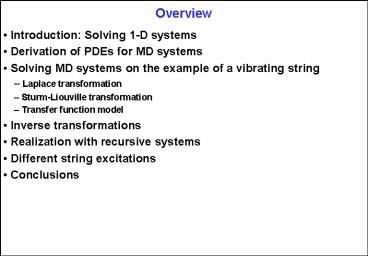Overview PowerPoint PPT Presentation
1 / 16
Title: Overview
1
Overview
- Introduction Solving 1-D systems
- Derivation of PDEs for MD systems
- Solving MD systems on the example of a vibrating
string - Laplace transformation
- Sturm-Liouville transformation
- Transfer function model
- Inverse transformations
- Realization with recursive systems
- Different string excitations
- Conclusions
2
Introduction Solving 1-D systems (I)
Example 1-D system only dependent on time t
Electrical network with lumped parameters
Ordinary differential equation (ODE)
R
L
u
(t)
(t)
C
u
c
- ODE cannot be implemented directly in the
computer - Direct discretization ? computational
ineffective - Laplace transformation and discretization ?
comp. effective
3
Introduction Solving 1-D systems (II)
Outline
Laplace-Transformation
Differentiation theorem
Laplace transf. of ODE
Transfer function model (TFM)
4
Derivation of PDEs for MD systems (I)
- Physical based MD systems are often time and
space dependent - they can be described by partial differential
equations (PDEs) - derivation of the PDEs by basic laws of physics
- here example of a longitudinal vibrating string
- String with
- A cross section area
- E Youngs modulus
- ? density
- F force on string element
String element of length dx
5
Derivation of PDEs for MD systems (II)
Strain on string element
Stress on string element
Hookes law
Force on string element
Fundamental law of dynamics
PDE after force elimination
with
? PDE describing longitudinal string vibrations
6
PDE of a transversal vibrating string
Now PDE for a transversal vibrating string with
dispersion and losses
? density A cross section area E Youngs
modulus I moment of inertia tension on the
string damping
PDE
Initial conditions
Boundary conditions
? will be solved in the temporal and spatial
frequency domain
7
Solving the PDE - Laplace transformation
Outline
Laplace transformation
- removes temporal derivatives
- includes initial conditions as additive terms
ODE
Boundary cond.
8
Solving the PDE - Sturm-Liouville (SL)
transformation
SL transformation
Differentiation theorem
Eigenvalue problem
?
SL transformation on ODE
- removes spatial derivatives
- includes boundary conditions as additive terms
9
Solving the PDE - Transfer function model
TFM
Inverse Laplace transformation of the TFM
with
10
Inverse transformation with respect to space
with
- inverse spatial transformation only a sum over
discrete frequencies µ
? a discretization with respect to time must be
done for computer implementation
11
Discretization with respect to time
- discretization of time tkt
- impulse invariant transformation (e.g.
z-transformation) - ? discrete transfer function model
z discrete frequency variable
- inverse Z transformation by applying the
shifting theorem - ? leads to a recursive system
- ? summation for inverse spatial transformation
- N recursive systems in parallel (not infinity to
avoid aliasing)
12
Realization with recursive systems
- structure contains only multipliers and delays
- can easily be implemented in real-time on DSPs
13
Excitation models (I) Plucked
E-bass
guitar to xylophone
spinet
14
Excitation models (II) Struck
(0)
v
y
(0)
h
h
Rec. System
(Hammer)
h
(
)
y
,k
x
a
-
NL
a
(0)
a
(N)
...
...
(0)
b
(N)
b
Rec. Systems
S
....
d
(string)
)
(
y
,k
x
a
Lowest piano note
15
Excitation models (III) Bowed
Finale
16
Conclusions
- Solution of 1-D systems with transfer function
models - Description of MD systems by PDEs
- Derivation of a MD system of a vibrating string
by basic physical laws - PDE of a transversal vibrating string was solved
by - Laplace transformation
- Sturm-Liouville transformation
- Transfer function model
- Inverse transformations
- Discretization
- Examples of excitation functions (plucked,
struck, bowed) - ? System can be implemented on a DSP for real
time sound synthesis - It is realized on a SHARC DSP (60MHz) with two
voices - and 100 harmonics per voice.

